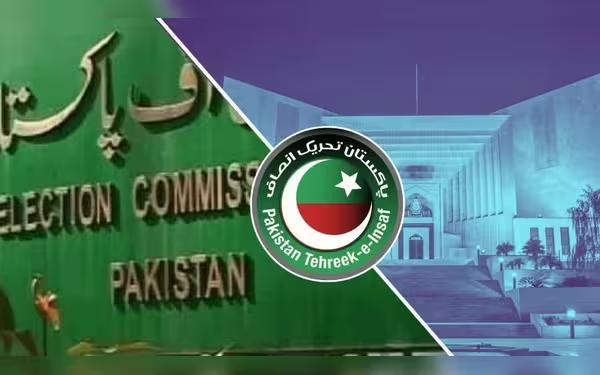Saturday, December 21, 2024 02:57 PM
Ecp Files Review Petition Against Supreme Court Ruling On Pti Membership
- ECP challenges Supreme Court's ruling on PTI membership.
- Judgment raises concerns over electoral legal framework.
- Implications for independent candidates and reserved seats.
 Image Credits: thefridaytimes
Image Credits: thefridaytimesECP files a review petition against a Supreme Court ruling affecting PTI membership and electoral processes in Pakistan.
The Election Commission of Pakistan (ECP) has taken a significant step by filing a review petition against a recent Supreme Court ruling that has raised concerns about the legal framework governing elections in the country. This ruling, which was made by a majority of the Supreme Court's full bench, has implications for the Pakistan Tehreek-e-Insaf (PTI) party and its members. The ECP argues that the Supreme Court's decision has rendered many provisions of the Elections Act ineffective, particularly regarding the registration of independent lawmakers as PTI members.
In a short order, the Supreme Court directed the ECP to register 39 independent lawmakers as PTI members within 15 days, as they had submitted nomination papers on PTI tickets. Additionally, the ECP was instructed to collect affidavits from 41 other independent members regarding their political affiliations, despite the fact that these members had already joined the Sunni Ittehad Council (SIC). However, the ECP did not publish a list of candidates who submitted affidavits or a new list of opposition members in the National Assembly.
In its review petition, the ECP highlighted that 80 candidates who contested the February 8, 2024, general election as independents had declared their affiliation with the SIC. The ECP emphasized that these candidates were fully aware of the legal consequences of their decision to join SIC and argued that the court should not assume otherwise. The ECP stated, "Even if subsequently a bid for reserved seats by the SIC failed, those independent candidates who had joined SIC had to stand by the consequences of their own decision taken earlier."
The ECP further contended that the Supreme Court's judgment reflects judicial overreach, as it has granted independent candidates an opportunity to retroactively declare party affiliation without proper basis. The ECP pointed out that the court's separation of independent-returned candidates into different categories is fundamentally flawed and does not consider the declarations made by unsuccessful candidates.
Moreover, the ECP raised concerns about the implications of the judgment on the allocation of reserved seats. It argued that the judgment does not address the situation of independent candidates who choose to remain unaffiliated, leaving unanswered questions about how reserved seats should be allocated. The ECP also noted that the PTI has failed to conduct intra-party elections, which has led to a lack of authorized leadership capable of issuing party tickets.
The ECP's review petition underscores the complexities surrounding the recent Supreme Court ruling and its impact on the political landscape in Pakistan. As the situation unfolds, it remains crucial for the ECP and the Supreme Court to clarify the legal framework governing party affiliations and the allocation of reserved seats to ensure a fair electoral process. The outcome of this case could have lasting implications for the future of political parties and their members in Pakistan.













